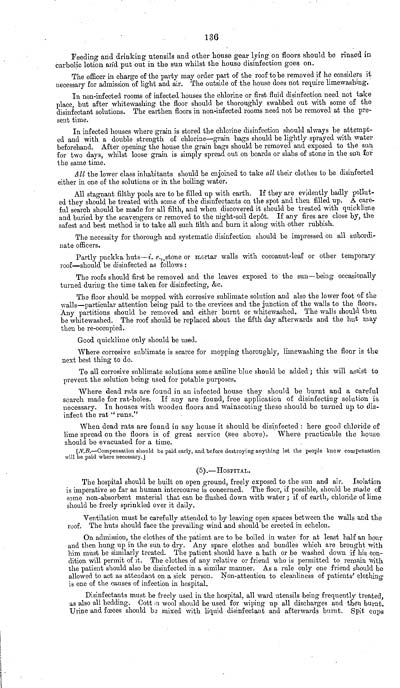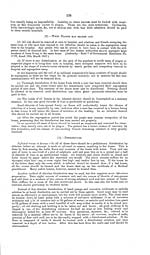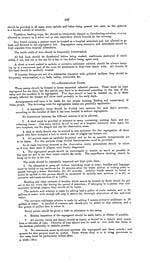Medicine - Disease > Account of plague administration in the Bombay Presidency from September 1896 till May 1897
(148) Page 136
Download files
Individual page:
Thumbnail gallery: Grid view | List view

136
Feeding and drinking utensils and other house gear lying on floors should be rinsed in
carbolic lotion and put out in the sun whilst the house disinfection goes on.
The officer in charge of the party may order part of the roof to be removed if he considers it
necessary for admission of light and air. The outside of the house does not require limewashing.
In non-infected rooms of infected houses the chlorine or first fluid disinfection need not take
place, but after whitewashing the floor should be thoroughly swabbed out with some of the
disinfectant solutions. The earthen floors in non-infected rooms need not be removed at the pre-
sent time.
In infected houses where grain is stored the chlorine disinfection should always be attempt-
ed and with a double strength of chlorine-grain bags should be lightly sprayed with water
beforehand. After opening the house the grain bags should be removed and exposed to the sun
for two days, whilst loose grain is simply spread out on boards or slabs of stone in the sun for
the same time.
All the lower class inhabitants should be enjoined to take all their clothes to be disinfected
either in one of the solutions or in the boiling water.
All stagnant filthy pools are to be filled up with earth. If they are evidently badly pollut-
ed they should be treated with some of the disinfectants on the spot and then filled up. A care-
ful search should be made for all filth, and when discovered it should be treated with quicklime
and buried by the scavengers or removed to the night-soil dept. If any fires are close by, the
safest and best method is to take all such filth and burn it along with other rubbish.
The necessity for thorough and systematic disinfection should be impressed on all subordi-
nate officers.
Partly puckka huts-i. e., stone or mortar walls with cocoanut-leaf or other temporary
roof-should be disinfected as follows:
The roofs should first be removed and the leaves exposed to the sun-being occasionally
turned during the time taken for disinfecting, &c.
The floor should be mopped with corrosive sublimate solution and also the lower foot of the
walls-particular attention being paid to the crevices and the junction of the walls to the floors.
Any partitions should be removed and either burnt or whitewashed. The walls should then
be whitewashed. The roof should be replaced about the fifth day afterwards and the hut may
then be re-occupied.
Good quicklime only should be used.
Where corrosive sublimate is scarce for mopping thoroughly, limewashing the floor is the
next best thing to do.
To all corrosive sublimate solutions some aniline blue should be added; this will assist to
prevent the solution being used for potable purposes.
Where dead rats are found in an infected house they should be burnt and a careful
search made for rat-holes. If any are found, free application of disinfecting solution is
necessary. In houses with wooden floors and wainscoting these should be turned up to dis-
infect the rat "runs."
When dead rats are found in any house it should be disinfected: here good chloride of
lime spread on the floors is of great service (see above). Where practicable the house
should be evacuated for a time.
[N.B.-Compensation should be paid early, and before destroying anything let the people know compensation
will be paid where necessary.]
(5).-HOSPITAL.
The hospital should be built on open ground, freely exposed to the sun and air. Isolation
is imperative so far as human intercourse is concerned. The floor, if possible, should be made of
some non-absorbent material that can be flushed down with water; if of earth, chloride of lime
should be freely sprinkled over it daily.
Ventilation must be carefully attended to by leaving open spaces between the walls and the
roof. The huts should face the prevailing wind and should be erected in echelon.
On admission, the clothes of the patient are to be boiled in water for at least half an hour
and then hung up in the sun to dry. Any spare clothes and bundles which are brought with
him must be similarly treated. The patient should have a bath or be washed down if his con-
dition will permit of it. The clothes of any relative or friend who is permitted to remain with
the patient should also be disinfected in a similar manner. As a rule only one friend should be
allowed to act as attendant on a sick person. Non-attention to cleanliness of patients' clothing
is one of the causes of infection in hospital.
Disinfectants must be freely used in the hospital, all ward utensils being frequently treated,
as also all bedding. Cotton wool should be used for wiping up all discharges and then burnt.
Urine and fces should be mixed with liquid disinfectant and afterwards burnt. Spit cups
Feeding and drinking utensils and other house gear lying on floors should be rinsed in
carbolic lotion and put out in the sun whilst the house disinfection goes on.
The officer in charge of the party may order part of the roof to be removed if he considers it
necessary for admission of light and air. The outside of the house does not require limewashing.
In non-infected rooms of infected houses the chlorine or first fluid disinfection need not take
place, but after whitewashing the floor should be thoroughly swabbed out with some of the
disinfectant solutions. The earthen floors in non-infected rooms need not be removed at the pre-
sent time.
In infected houses where grain is stored the chlorine disinfection should always be attempt-
ed and with a double strength of chlorine-grain bags should be lightly sprayed with water
beforehand. After opening the house the grain bags should be removed and exposed to the sun
for two days, whilst loose grain is simply spread out on boards or slabs of stone in the sun for
the same time.
All the lower class inhabitants should be enjoined to take all their clothes to be disinfected
either in one of the solutions or in the boiling water.
All stagnant filthy pools are to be filled up with earth. If they are evidently badly pollut-
ed they should be treated with some of the disinfectants on the spot and then filled up. A care-
ful search should be made for all filth, and when discovered it should be treated with quicklime
and buried by the scavengers or removed to the night-soil dept. If any fires are close by, the
safest and best method is to take all such filth and burn it along with other rubbish.
The necessity for thorough and systematic disinfection should be impressed on all subordi-
nate officers.
Partly puckka huts-i. e., stone or mortar walls with cocoanut-leaf or other temporary
roof-should be disinfected as follows:
The roofs should first be removed and the leaves exposed to the sun-being occasionally
turned during the time taken for disinfecting, &c.
The floor should be mopped with corrosive sublimate solution and also the lower foot of the
walls-particular attention being paid to the crevices and the junction of the walls to the floors.
Any partitions should be removed and either burnt or whitewashed. The walls should then
be whitewashed. The roof should be replaced about the fifth day afterwards and the hut may
then be re-occupied.
Good quicklime only should be used.
Where corrosive sublimate is scarce for mopping thoroughly, limewashing the floor is the
next best thing to do.
To all corrosive sublimate solutions some aniline blue should be added; this will assist to
prevent the solution being used for potable purposes.
Where dead rats are found in an infected house they should be burnt and a careful
search made for rat-holes. If any are found, free application of disinfecting solution is
necessary. In houses with wooden floors and wainscoting these should be turned up to dis-
infect the rat "runs."
When dead rats are found in any house it should be disinfected: here good chloride of
lime spread on the floors is of great service (see above). Where practicable the house
should be evacuated for a time.
[N.B.-Compensation should be paid early, and before destroying anything let the people know compensation
will be paid where necessary.]
(5).-HOSPITAL.
The hospital should be built on open ground, freely exposed to the sun and air. Isolation
is imperative so far as human intercourse is concerned. The floor, if possible, should be made of
some non-absorbent material that can be flushed down with water; if of earth, chloride of lime
should be freely sprinkled over it daily.
Ventilation must be carefully attended to by leaving open spaces between the walls and the
roof. The huts should face the prevailing wind and should be erected in echelon.
On admission, the clothes of the patient are to be boiled in water for at least half an hour
and then hung up in the sun to dry. Any spare clothes and bundles which are brought with
him must be similarly treated. The patient should have a bath or be washed down if his con-
dition will permit of it. The clothes of any relative or friend who is permitted to remain with
the patient should also be disinfected in a similar manner. As a rule only one friend should be
allowed to act as attendant on a sick person. Non-attention to cleanliness of patients' clothing
is one of the causes of infection in hospital.
Disinfectants must be freely used in the hospital, all ward utensils being frequently treated,
as also all bedding. Cotton wool should be used for wiping up all discharges and then burnt.
Urine and fces should be mixed with liquid disinfectant and afterwards burnt. Spit cups
Set display mode to: Large image | Zoom image | Transcription
Images and transcriptions on this page, including medium image downloads, may be used under the Creative Commons Attribution 4.0 International Licence unless otherwise stated. ![]()
| India Papers > Medicine - Disease > Account of plague administration in the Bombay Presidency from September 1896 till May 1897 > (148) Page 136 |
|---|
| Permanent URL | https://digital.nls.uk/74517306 |
|---|




